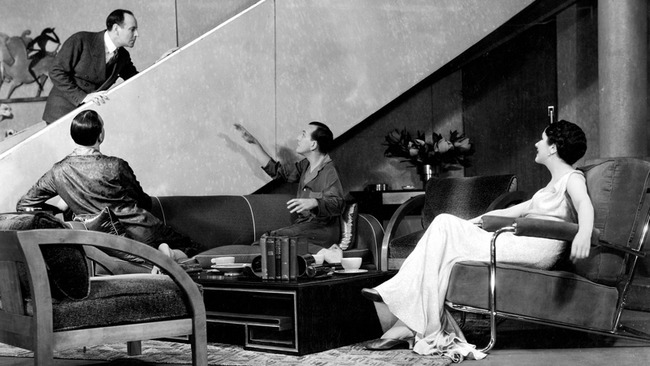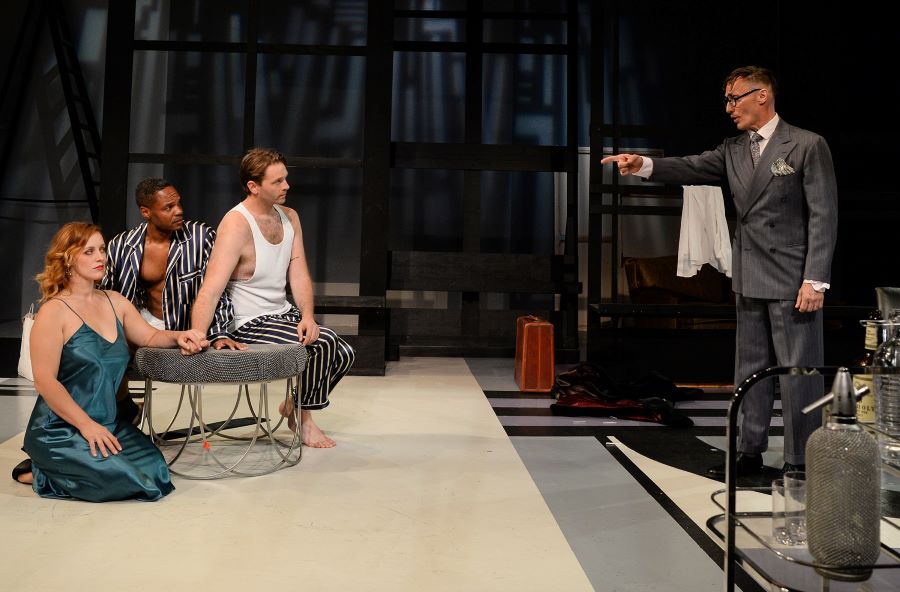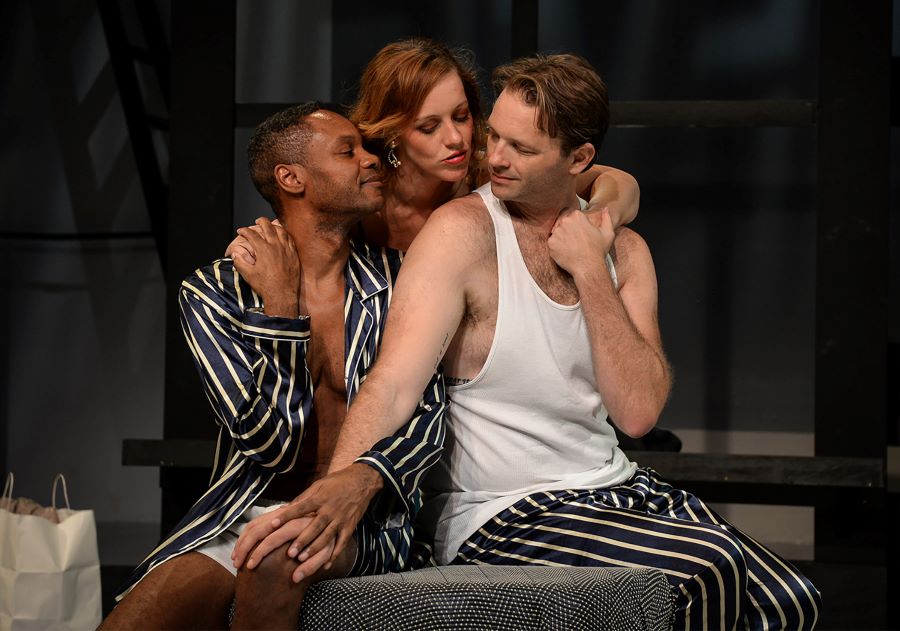When I tell people L.A. theatre formed my tastes, I usually feel the need to say more by way of explanation, as the city still has a reputation in some circles (particularly on the opposite coast) as a cultural wasteland and certainly not a theatrical hub of any note. All this despite being the home of East West Players, Cornerstone Theater Company, the Actors’ Gang, Center Theatre Group, A Noise Within, Theatre of NOTE, Antaeus, Independent Shakespeare Co., Boston Court, the Fountain, the Odyssey, Pasadena Playhouse, Latino Theater Company, Actors’ Co-op, Open Fist, Theatre 40, the Colony—and those are just some of the theatre companies still fully producing. If I were also to list the ones I eagerly followed in the years I lived there (roughly 1990 to 2005) that have folded or pivoted from full production, I would have to include Zoo District, Los Angeles Theatre Center, the Cast Theatre, Burglars of Hamm, the Matrix, Circle X, and, perhaps above all, the Evidence Room.
The latter kicked off in temporary digs in Culver City before settling into its ideal space, a cavernous former bra factory on Beverly Blvd. just west of downtown L.A., in 2000. It was there that artistic director Bart DeLorenzo programmed uniquely exciting and ambitious seasons (David Edgar’s Pentecost, Edward Bond’s Saved, Chuck Mee’s The Berlin Circle, and Kelly Stuart’s Mayhem are just a few typical examples) and held court at the theatre’s hopping bar afterward. Indeed, I remember Bart once saying, half-seriously, that he thought of producing plays as simply a pretext for the lively conversations they sparked afterward.
In the years since the old Evidence Room company disbanded and left that magical space (which immediately became a hot music venue, The Bootleg), Bart has mounted occasional shows under the old company name, as well as teaching theatre at Cal Arts and directing freelance—indeed, enough that TCG gave him an Alan Schneider Director Award at in 2012. His latest production, a new staging of Noël Coward’s fizzy, subversive 1932 comedy Design for Living, hits two touchstones for me: fond memories not only of Bart’s shrewd direction of a wide range of material, but of a sparkling, stimulating production of the play I adored at A Noise Within in 1997, directed by Sabin Epstein.
Bart’s staging of Design for Living runs through Aug. 25 at the Odyssey Theatre in West L.A. I spoke to him recently about the original play (in which Coward himself starred opposite Alfred Lunt and Lynn Fontanne), as well as about Ibsen, orgasms, and the state of the theatre.
ROB WEINERT-KENDT: I just reread the play today, and it’s a ride. What drew you to it?

BART DELORENZO: Well, I think what got me going on this play was listening to my students in the past couple of years talk about identity as opposed to individuality. I think Coward was dealing with the gender and identity issues of his time and blowing them up, saying you need to live your own life—you need to define yourself, to find your family, and as long as you’re not hurting anybody, you need to have a great time. I worry that my students are not having a great time, because they’re held back by so many of these concerns. It’s a play about liberation. So I thought, let’s have this play now. I’ve always really liked it. Did you know that it was his favorite play?
I’m not surprised.
At least, according to Graham Payn, his last partner, this was Coward’s favorite play. And it makes sense to me. He writes this in the ’30s, before he lives it. It basically makes his design for living later: He lives a life surrounded by friends and lovers. Anyway, I just thought a play about love and liberation sounds good for this moment.
The play was ahead of its time, certainly—nearly a century before the word “throuple” became a thing.
Did you watch that series Couple to Throuple?
No, is it worth my time?
No, it’s the trashiest thing I’ve ever seen. It could have been profound, except the people who agree to go on a show like that prevent that from happening. It’s like a car accident: You cannot take your eyes away.
So that show hasn’t informed your direction.
Not in the slightest. I suppose the characters in Design for Living are in some ways exhibitionist, but everyone on that TV show is a blatant exhibitionist, so it’s different.
I’m curious how “in period” your production is going to feel. It’s hard to get away from that plummy British diction with Coward’s dialogue, isn’t it?
I’m going to experiment with how far you can get away from it. Because, I don’t know about you, but often when I am watching or listening to one of those, I just tune out when they start all of that clipped delivery, because I kind of know how every line is going to be said, you know? It just becomes completely automatic. So I entered this with the idea that I didn’t want to do that. I decided I was going to try to look at it completely freshly, as if it were a new play or a play by William Shakespeare. Then I can just do whatever I want; I don’t have to do the house style. So we will not be using British accents. I mean, it’s not like Alfred Lunt was British, and he was in the original. We’re just exploring what it’s like if they’re speaking from their hearts.
Still, there are idioms that are very 1930s. Some of them I had to look up, like, “She knows her onions.”
That’s a good one. The hardest reference is “reached for a Murad.” We’re like, What the hell is that? It turns out that was a brand of cigarettes, and there was a very popular series of advertisements for it in The New Yorker, and the caption was, “For life’s awkward moments, don’t be perturbed—reach for a Murad.” So yes, this production will be set in the ’30s, but I’ve encouraged all the designers to look toward that but also away. As when I did Saved, I didn’t want to do a ’60s fashion show; with this I don’t want to do a ’30s fashion show.

What I especially remember from the Epstein production was that it seemed absolutely clear that all three points of the triangle fully mattered: Gilda and Otto, Gilda and Leo, but also Leo and Otto. Rereading it today, it’s clear that Coward was pulling his punches a bit in terms of how explicit he was about Leo and Otto being a sexual couple too.
Yes, it’s very coded. It’s funny, because I’ve been reading his short stories as well, and they’re extremely coded. One is about a gay romance that goes bad, and you would never know it unless you read between the lines. He doesn’t say anything overt.
Even though he’s more clear about the straight sex here, the drama is not all about the sex per se—they talk a lot about affections and feelings.
I mean, he doesn’t think that sex is the most important thing, even though everyone obsesses about it. Coward says this in interviews all the time: He believes in love, you know. That is the important thing. Sex is fantastic, but it’s a more transitory thing.
Well, yes, it would be painful otherwise, right? Unless you’re into Tantric stuff.
I’ve never engaged in Tantric sex, so I can’t comment on that. I remember when I was doing that Philip K. Dick play, Flow My Tears, the Policeman Said, and that incestuous sister has that chair that she says boosts your orgasm to 100 times what it is. That sounds terrifying. 100 times, really? It’s kind of fine where it is, to be honest. I don’t need it pumped up, thank you so much. But I guess everyone’s different.
Does the Evidence Room still do about a play a year? I regret to say I haven’t kept up.
The company still exists, but we haven’t been producing for a while. Last year I directed Ghosts for the Odyssey; that was not with the Evidence Room. I also did this piece with Sandra Tsing Loh that we spent a lot of time on and we sold out the whole run without ever opening to the press, which was an amazing experience. And I’ve been teaching a lot at CalArts. I can’t say that I’ve been bored or sad, but I’m happiest when I’m directing.
I don’t know. I’m scared for the American theatre. That’s another reason I wanted to do a crowd pleaser. When I did Ghosts at the Odyssey it was the best-selling show I’ve ever done there, I think because it was like a classic play, and people are hungry for substance.

Ghosts is hardly a crowd pleaser, though, right?
I know, I couldn’t believe how many people came to it.
And Enemy of the People was just a huge hit on Broadway, so maybe Ibsen can be a hitmaker after all.
I mean, people were sobbing at the end of Ghosts. I remember this one day, it was a matinee, and this woman—her husband was trying to comfort her, but she was…I mean, you hear that word inconsolable, that’s what this was. She just kept saying, “It’s so wrong, it’s so wrong.” It’s like, my God, if Ibsen has that power…
I ask a lot of theatre leaders how their theatres are doing. How do you feel about L.A. theatre, not only after the Covid lockdown and reopening, but since the end of the old 99-seat plan?
Well, there’s a hell of a lot less. The Odyssey turned Equity because they had to. I’m amazed that I found a way to do this play with seven actors; you know, the kind of theatre I like has a lot of people. I just think it’s important to put the world onstage. So it scares me how impoverished most things are now. I can keep picking two-character plays to do; there are some good ones. But it’s not really what I think theatres should be doing or what I want to go see. If I love the theatre and feel this disheartened, how do you think the average person feels? Are we doing anything to appeal to these people? TV is pretty fucking good, you know.

You said this play is about love and liberation. Indeed, I’d forgotten till I reread it how the ending is basically all three of them together, bucking convention and toasting their future as a threesome. It feels like a happy ending, no?
I think it is a tempestuous ending. I think what Coward is saying is, Why be so afraid of the tempest? It’s like: They’re going to be happy, and then they’re going to change it, and then they’re going to be happy and then they’re going to change it—they’re just going to keep mucking it up. You know, Ernest says he wants a life without fuss, and she can’t have a life without fuss. And what’s wrong with fuss? I don’t know if you saw that movie Challengers…
No, but it’s an obvious point of comparison.
Right, you have to talk about it, because it’s the throuple movie of the year. I think the first half of Challengers is very much the same as Design for Living, except that Challengers ends up having a lot more tennis. It becomes a little too tennis-y for my taste—I wish it were more throuple-y and less tennis-y. But I adore Josh O’Connor; he’s one of my very favorite actors these days. I was listening to him talking about it on NPR and they asked the big salacious question about whether it’s gay or straight or whatever, and Josh O’Connor—I love what he said, he said, “I didn’t really think of it that way. I just think that this character really wanted this relationship, and couldn’t see a life without this relationship.” And by relationship he means the three. So, as Otto says to Gilda, “It’s foolish for you to keep asking yourself, which of us you like most? Because”—then he yells—“you don’t know!”
I think that’s true of a lot of us in a lot of situations, because we try to define these things that we don’t even know the answer to. I mean, I always felt stumped the first few years when you had to give your pronouns. I feel ridiculous saying “he/him.” I’ve never felt that much attached to my maleness, to be honest with you; I don’t feel attached to femaleness either. These young people with all their piercings and hair color, they want to define all this. I hope this play will turn them on and excite them to live their lives without these crippling definitions.
And just entertain them, which is a good thing.
It’s a blessing. It’s so important to laugh. You know, the Odyssey wanted to do this play at the end of the season, and I was like, “Well, then it will be running during the election; I don’t think this is an election play.” You could argue that it is a trivial play. I don’t agree with that, but it will seem incredibly trivial as the country is set on fire.
Rob Weinert-Kendt (he/him) is editor-in-chief of American Theatre.


